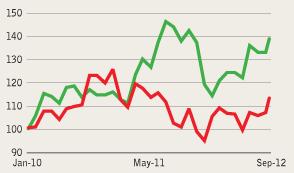Ups and Downs
The Burmese currency remained stable, with the buying rate finishing on Friday at 971 kyat, down 2 kyats from last week, while the selling rate increased slightly to 979 kyat from 978 kyat the week before. Meanwhile, the price of gold increased to 678,300 kyat per tical, a small increase 678,000 kyat the week before. Fuel prices remained the same, with petrol selling at 820 kyat per litre, diesel at 950 kyat per litre, and octane at 920 kyat per litre. The price of rice also did not change, with high-quality Pawhsanmwe rice going for 1,300 to 1,700 kyat per basket and low-quality Manawthukha rice going for 900 kyat per basket.
Govt to up country’s electricity reserves by 30 percent
Burma’s government plans to increase the country’s electricity reserves by 30 percent to prevent nationwide power outages, Deputy Union Minister for Electric Power Maw Tar Htwe said to the Myanmar Business Today last week. The country’s annual electricity consumption rate increases by 13 percent every year, while the electricity sector is still underdeveloped, with only 30 percent of the population getting electricity. The government plans to produce about 23,000 megawatts of electricity by the fiscal year of 2030-31.
Burma a ‘candidate country’ for EITI-compliant status
Burma’s application to join the Extractive Industries Transparency Initiative (EITI), a set of voluntary reporting standards pertaining to revenue transparency and resource governance, has been accepted. Burma will have 18 months to produce its first report, and a decision on whether or not its efforts have been sufficient to grant the country “compliant” status will occur within three years. EITI standards aim to promote revenue transparency by ensuring that payments from companies operating in extractive industries – namely mining and oil and gas – match revenues received by governments.
Read more: http://www.dvb.no/news/burma-a-candidate-country-for-eiti-compliant-status-myanmar/42017
France’s largest bank hit with $9B fine for violating US sanctions
France’s largest bank, BNP Paribas (BNPP), will plead guilty to violating US trade sanctions by processing billions of dollars for Burmese entities – as well as institutions from Iran, Sudan and Cuba – via US financial institutions, and will face a record penalty of nearly US$9 billion. According to a 30 June statement by the US Department of Justice (DOJ), BNPP’s admission of guilt is “the first time a financial institution has agreed to plead guilty based on large-scale, systematic violations of US economic sanctions.”
Burma cannot meet fuel demands, deputy energy minister says
Burma’s domestic fuel production can only meet 10 percent of the country’s demand for diesel and 40 percent of demand for petroleum, said Deputy Energy Minister Myint Zaw on Tuesday at a parliamentary session, He said the majority of demand for fuel is met with foreign oil imports while the government is currently preparing a five-point energy security policy to increase domestic production. He added that Burma imported nearly 100 million gallons of diesel and 33 gallons of petrol last year to meet domestic demand.
38 times more Burmese internet users in two years
The number of internet users in Burma has jumped from 66,000 in 2011-12 to 2.5 million in 2013-14, a 38-fold increase. State-owned provider Myanmar Posts and Telecommunications says it plans to increase bandwidth by 700 percent to meet the ever-growing demand.
Trade deficit widens
Burma’s trade deficit has increased over the first two months of the fiscal year and now stands at over US$947 million, according to state-owned Myanmar News Agency, citing a report by the Central Statistical Organisation (CSO). Exports are listed at almost $1.54 billion while imports stand at a total of $2.5 billion. Exports include metal, gems, livestock, fishery and farm products, and timber.
Taiwanese shoe manufacturer to invest $100M in Burma
A Taiwan-based manufacturer will invest more than $100 million to construct a shoe factory that will produce 300,000 pairs a year. Pou Chen Group, one of the largest footwear manufacturers in the world, announced that they hope to start production in Burma at the end of 2015 and will likely increase its capacity to product 800,000 pairs a year by 2018. Currently, Pou Chen has shoe factories in China, Vietnam and Indonesia.



